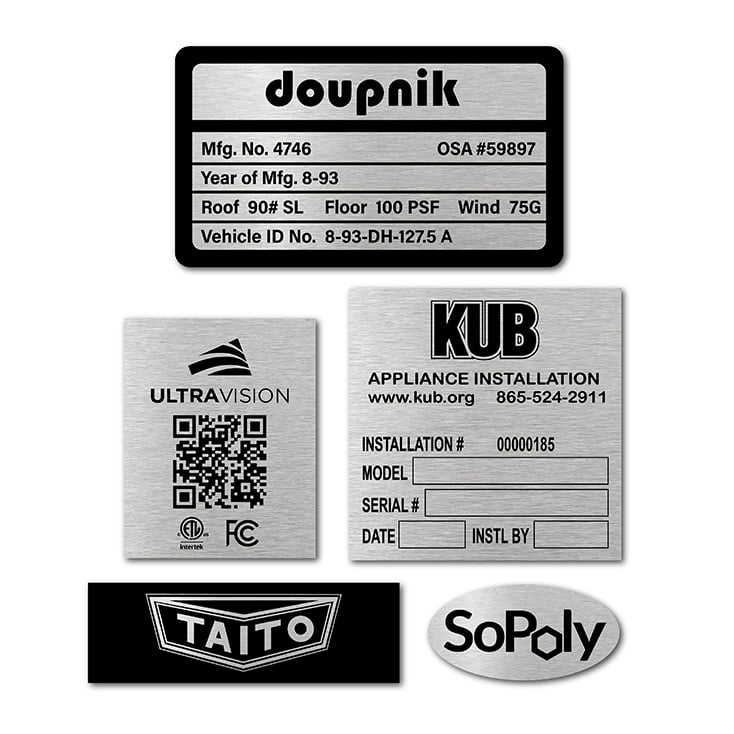 Inland Products designs, develops, and delivers high-quality identification products including metal labels. Our labels’ durable construction makes them suitable for use in normal or demanding environments.
Inland Products designs, develops, and delivers high-quality identification products including metal labels. Our labels’ durable construction makes them suitable for use in normal or demanding environments.
Applications of Metal Labels
Industry professionals employ metal labels for a number of purposes, including the following:
- Product identification: Manufacturers apply labels on products to facilitate identification and tracking during production, finishing, and distribution operations and to ensure traceability after purchase.
- Product usage and safety instructions: In addition to product information, manufacturers may include usage and safety instructions on product labels to ensure that end-users use their goods correctly.
- Branding: Product labels also serve as a convenient and natural way of branding products.
Advantages of Metal Labels
For the above applications, there are many reasons to use metal labels over alternatives, most notable are durability and longevity. Read on to discover more about these advantages.
Better Durability
As these labels are made from metal, they’re better able to maintain their integrity when used in harsh environments. Depending on their design and construction, they can withstand exposure to abrasive, corrosive, and otherwise damaging compounds, which makes them suitable for use in many industrial applications.
Greater Longevity
Since metal labels are more durable than plastic or paper labels, they can continue to perform their function for much longer. Whether they’re designed to indicate model and lot numbers, provide usage and safety information, or display an identifying logo on a product, metal labels are ideal long-term solutions.
Customization Options for Metal Labels
Similar to other types of labels, metal labels are highly customizable. Inland Products can tailor them to suit your variable needs in regard to the following:
- Design: Metal labels are available in fully finished and blank variations. Fully finished labels are finished with the desired information and/or designs before they are shipped to you, while blank labels allow you to add information and designs as needed.
- Material hardness: Metal labels can be made from either rigid or flexible materials, depending on the intended application. Rigid metal labels offer greater durability but are not ideal for uneven or irregular surfaces. Flexible metal labels conform more closely to non-flat product forms but may not be as durable as rigid ones.
- Shape: By employing different dies or laser cutting technology, we can create metal labels in a wide range of shapes and sizes. This ability is especially beneficial for branding purposes, as you the customer can tailor the label to suit your company’s aesthetic.
Some of the most common types of metal labels include:
- Data labels: Data labels include serialized identification data such as barcodes.
- Instruction labels: Instruction labels display user instructions for equipment.
- Maintenance labels: Maintenance labels contain maintenance and servicing details.
- OSHA safety labels: OSHA Labels are designed to comply with OSHA safety standards.
- QR code labels: QR code labels feature QR codes that, when scanned, direct users to additional product information.
- Serial number labels: Serial number labels help identify and track specific products during and after production and distribution.
- UID labels: Unique Item Identifier (UID) labels are designed to help track products and equipment.
Request Your Metal ID Labels Today
Metal labels are an effective method of conveying important information to end-users. For all of your metal label needs, turn to the experts at Inland Products. To learn about our custom metal label capabilities or receive pricing details, contact us or request a quote today. Alternatively, order online using our custom metal labels ordering page on our IdentificationTags.com website.

